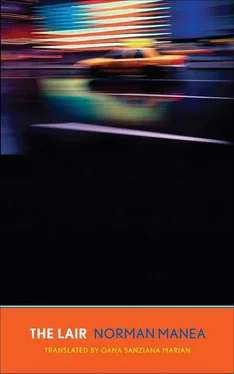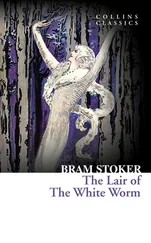“The buck? What buck?”
“Tim had hunted a buck. He had a rifle, and a license for it. It was hunting season. So it was all legal. The scandal came after the flaying. He’d brought the shot buck back to the college, and he’d flayed it in his room, together with other students. When he was called to the president’s office, Tim excused himself, but he also called for clear and severe measures against the person who might have, at some point, raped Tereza.”
“Tim is now the head of some organization that advocates the rights of immigrants in Santa Fe; Tereza is married with three children, and the assailant is a lawyer on Wall Street. You asked me to explain to you every aspect of the incident, so that you could understand your new home.”
“Yes, yes, and now I have a question for you. Could Palade have been an informant?”
I imagined that Gora raised his eyebrows to the sky.
“You should be able to find out if he was. Or if he could have been, since we’re hypothesizing. Many who could never have been actually were. So does that mean that they could have been, if they actually were? Even if no one, not even they, suspected? We can’t ignore the when, the why, and the how they became what they couldn’t have been.”
“Forgive me, maybe this isn’t the best time for this kind of conversation.”
“Oh, sure it is.”
“I think about it often, that’s all. It’s my fault that I haven’t let go of the old toxins. We should be talking about America.”
“Yes, it would be more interesting. Our stories seem interesting only because they are bizarre.”
“Okay. I promise I’ll call with happier occasions for conversation.”
“That would make me happy. No one calls me.” It wasn’t at all clear whether it would actually make him happy or not, but I no longer felt guilty for what I’d insinuated.
The old hag jerks him around, tightening her grip around his neck. Dressed in a thin, transparent blouse made of white satin. She strangles him scrupulously, with grave attention, with glee. A diaphanous, satin death. But just when you think you’ve escaped your earthly sins, she lets go, slowly, delicately, with infinite care. You shake out of your nightmare, you wake up in front of the Folder.
On the cover, the date of birth. In a different time, that was the age of the wise; now it’s the age of Viagra. The old von Aschenbach, who was embarrassed even by the makeup with which his barber rejuvenated him, could never have imagined what wonders would have been waiting for him in the next century. A time of infinite possibility and infinite substitutions. Substitutions of kidneys and livers, of new noses and lips and new eyebrows, new eye color and gender, all at the client’s behest. Pills for your head and your feet, for narcolepsy and insomnia, for insanity, colds, and for cancer, for impotence and for envy, baldness and rheumatism, heart transplants and hair transplants and retina transplants, hearing and seeing and walking aids. Nothing is lost, everything is transformed and can be replaced. The dead have finally found their proper utility; last will and testaments foresee the transference not just of assets but also of organs, the spleen, the liver, the kidneys, and the soul, all ready to serve a new body and to become new themselves.
How did all this time go by?
The exile had accepted this new place and time; he’d assimilated to the fax and the Internet and the cellular telephone, the bank account and flying saucers, religious and erotic sects, education through the Bible and pornography; however, he’d remained in a past named Lu.
Why would Mynheer Pieter Peeperkorn have fascinated him so, when he was the total opposite of everything Peeperkorn was or could ever have been; why would he have reanimated Peter Ga  par? And why had he never forgotten that conversation with the pudgy Izy, thousands of years ago, in the dark and dank basement, when he divulged his admiration for Jesus’ chosen people, even though he himself would always remain religiously indifferent? What was he missing and what would explain his ever-unresolved need to become someone else? Someone less cautious, someone less remarkable. More rebellious, and not just in his thoughts, freer, and not just in his dreams, more versatile and hypocritical, more mysterious, more culpable and haunted by hostility. Someone more worthy of hate and compassion and the admiration of the masked people who surrounded him.
par? And why had he never forgotten that conversation with the pudgy Izy, thousands of years ago, in the dark and dank basement, when he divulged his admiration for Jesus’ chosen people, even though he himself would always remain religiously indifferent? What was he missing and what would explain his ever-unresolved need to become someone else? Someone less cautious, someone less remarkable. More rebellious, and not just in his thoughts, freer, and not just in his dreams, more versatile and hypocritical, more mysterious, more culpable and haunted by hostility. Someone more worthy of hate and compassion and the admiration of the masked people who surrounded him.
On top of the new earthy-gray folder on which destiny had written in large, red letters, gora, there was a blue sheet of paper with Dr. Hostal’s signature.
It seems that the coronary artery disease and the epigastric discomfort were unrelated. The angioplasty results show that there was a combination of a focalized and a diffused illness, which may have triggered a metabolic syndrome from the past, a state of hypercoagu-lation. Considering the risk factors of cardiovascular disease, the patient’s arterial hypertension is borderline; borderline hypercholesteremia (and low HDL) is at a normal level; and borderline blood sugar.
Borderline! The Citizen of the Borderland Archipelago! The character might be read in the code of Borderland. On the line, on the borderline, nowhere! Borderline!
The Citizen of the Borderline had pulled the curtains. Go to the zoo! He was talking to himself. In the zoo of the street, he would meet others like himself. Instead, he stays at home, like a vehicle forgotten in the garage.
The coffee, the cereal bowl, the pills. On the TV screen, the mischief of his species, chess players competing with destiny.
Exercises, shower. The day begins. He’d won another day, nothing could compare with that performance, his fellow citizens in the New World would have him believe. They were right. A new day. The farce of being, the wonder of existence.
He was watching the screen, the table where the ponderous Peter was playing chess, with the glass of Coca-Cola nearby. It was late.
It was late, but I’d defied the hour.
“Did you read the piece about the angioplasty?”
“Where would I have read it?”
“Today, in the New York Times. Front page news.”
“I don’t get the papers anymore. I would only read old newspapers, if I could, starting with the year of my birth. From seven decades ago.”
“That could be amusing. But you would miss all the new medical discoveries.”
“Such as?”
“Such as these, what do they call them … stents.”
“I’ve heard that word before.”
“They came up with a new model a few years ago, coated with some kind of substance that impedes further buildup in the arteries. But now they are saying the old ones were better.”
“They gave me the new ones, the ones impregnated by the saliva of Mephistopheles. I had insisted on whatever was newest, most efficient. Dr. Hostal agreed. He’s a trustworthy man.”
“Eh, don’t get melodramatic. In two months they’ll discover that the new ones are actually better.”
“The most important thing, however, is that, after you rot, those little amulets will still survive. The archeologists will be able to identify you.”
“How many did they give you?”
“Seven. A magic number.”
I was lucky. Gora was in a mood to talk.
“You know, Palade was your student. They refused his passport but gave it to him after a year, on the second try. In response to pressure from the Americans. They gave it to him begrudgingly. That seems strange.”
“What’s so strange about it? I know what you’re insinuating.”
“I’m not insinuating anything; I’m asking. I’m trying to cure myself of the illness with which we all left that place: suspicion.”
Читать дальше

 par? And why had he never forgotten that conversation with the pudgy Izy, thousands of years ago, in the dark and dank basement, when he divulged his admiration for Jesus’ chosen people, even though he himself would always remain religiously indifferent? What was he missing and what would explain his ever-unresolved need to become someone else? Someone less cautious, someone less remarkable. More rebellious, and not just in his thoughts, freer, and not just in his dreams, more versatile and hypocritical, more mysterious, more culpable and haunted by hostility. Someone more worthy of hate and compassion and the admiration of the masked people who surrounded him.
par? And why had he never forgotten that conversation with the pudgy Izy, thousands of years ago, in the dark and dank basement, when he divulged his admiration for Jesus’ chosen people, even though he himself would always remain religiously indifferent? What was he missing and what would explain his ever-unresolved need to become someone else? Someone less cautious, someone less remarkable. More rebellious, and not just in his thoughts, freer, and not just in his dreams, more versatile and hypocritical, more mysterious, more culpable and haunted by hostility. Someone more worthy of hate and compassion and the admiration of the masked people who surrounded him.










